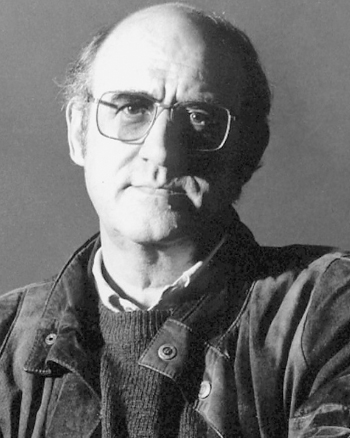History of Hymns: “Cuando el Pobre”
By Diana Sanchez-Bushong

Miguel Manzano
Cuando el Pobre (When the Poor Ones)
by J.A. Olivar and Miguel Manzano, trans. George Lockwood
The United Methodist Hymnal, No. 434
When the poor ones who have nothing share with strangers,
when the thirsty water give unto us all,
when the crippled in their weakness strengthen others,
[Refrain]
then we know that God still goes that road with us,
then we know that God still goes that road with us.
Translation © 1980 The United Methodist Publishing House. Used with permission.
Based on “the great judgment,” a parable found in Matt. 25: 31-46, “Cuando el pobre” speaks of the plight of the poor and marginalized. Influenced in part with the early movement of liberation theology, this hymn seeks to name the many ways humanity is oppressed and how God, in Christ, is present. God is on the journey with all people—the oppressed, the liberators, and those seeking to promote peace and justice.
The first stanza speaks of the generosity of those who have very little and, in doing so, their becoming the hands and feet of Christ. The journey that Christ makes with humanity is not only a spiritual one, but a very real one when Christ is present in the very people, who even in their suffering, become the embodiment of the One who liberates every need.
The second stanza centers more on the possible outcomes of suffering that is staunched by fellow Christians—comfort, hope and love. When suffering is ceased, there is comfort. Suffering is a state of not accepting what is, and either the situation changes or the mindset changes in order to find comfort. This stanza shows the choice we can make to live in suffering or comfort, hopelessness or hope, hate or love, and when we choose the positive state, we choose God.
The third and fourth stanzas are increasingly more positive in nature as the author addresses joy, truth, and simplicity as ways of journeying with God. The final stanza brings together images of home, peace, and human kindness to strangers. What started as a hymn about suffering and oppression ends with a statement of assurance and peace, a peace that allows us to imagine home and even include in that home strangers, all because we know that God journeys with us through all of it!
The tune EL CAMINO is reminiscent of a Latin ballad with its gentle, undulating rhythm in 6/8 that so beautifully fits the word stress of this text. Both rhythm and harmony are unhurried, yet press forward toward the refrain. The refrain is more in the style of a chacarera, a contemporary musical style from Argentina that is characterized by beginning in 6/8 and then employing a hemiola (2 beats against 3) at the end. In EL CAMINO, the rhythmic stress shifts in the refrain, thereby producing a hemiola, most notably on the word “mismo” or “same.” The meaning here is God travels with us, goes the same road with us, and the rhythmic change seems to accentuate that coming together of God and humanity on the same journey.
This hymn was originally included in Celebremos, Segunda Parte, 1983, #32, a resource compiled and edited by Roberto Escamilla at the urging of MARCHA (Methodists Associated Representing Concerns of Latin America). This songbook of bilingual hymns was a great beginning toward the collection of indigenous Latin American hymns that eventually were included in a full hymnal for the Spanish speaking church, Mil Voces para Celebrar (1996). The translation of “Cuando el Pobre” was made by Rev. George Lockwood (b. 1946), who served as a missionary to Costa Rica and also served on the editorial committee for the Methodist hymnal supplement, Celebremos II. I was fortunate to serve as a staff consultant to the hymnal revision committee and attended most of the meetings, including the meeting dealing with Latin American hymns and this hymn in particular. As in many translations of Spanish hymns, the issue of non-inclusive language is a challenge. That was the case on the final stanza that talks about calling a stranger our “brother.” Lockwood’s original translation was calling a stranger a “friend,” but the problem was taking a three syllable word “hermano” and making it fit the music with only a one syllable word. As it happened, I offered up “a neighbor” (a two syllable word with an article “a”) and it worked well with the music!
Author Miguel Manzano (b.1934) was composer, researcher of traditional folk music, Superior Professor of Music and Performing Arts, and the Professor of Ethnic Music at the Higher Conservatory of Music in Salamanca, Spain (1990-2002). He is well known for his research in the area of folk songs, but is equally known for his own vocal and instrumental compositions. In addition, Manzano spent many years as a church musician and studied at the Catholic Institute of Paris. He is internationally recognized as a musician, researcher of folk music, and composer.
José Antonio Olivar, a writer and journalist, studied at the Seminary of Covadonga and Oviedo. He has won several national awards for poetry and has worked as a journalist in popular newspapers and national agencies. He has traveled around the world, interviewing and making friends with the most diverse personalities from all fields of social life, art, and politics.
References
Diana Sanchez, Volume Editor, The Hymns of The United Methodist Hymnal (Nashville: Abingdon Press, 1989)
Carlton Young, The Companion to the United Methodist Hymnal (Nashville: Abingdon Press, 1993)
About this month’s guest writer:

Diana Sanchez-Bushong is the Director of Music and Worship at Westlake UMC, Austin, Texas. She served as the Director of Church Music Resources for the General Board of Discipleship from 1986-1993. She was a staff consultant to the Hymnal Revision Committee that produced The United Methodist Hymnal 1989 and also Mil Voces Para Celebrar, 1996. She continues to write, lecture, and teach in the area of worship and music.
This article is provided as a collaboration between Discipleship Ministries and The Fellowship of United Methodists in Music and Worship Arts. For more information about The Fellowship, visit UMFellowship.org/Hymns.


Contact Us for Help
Contact Discipleship Ministries staff for additional guidance.
